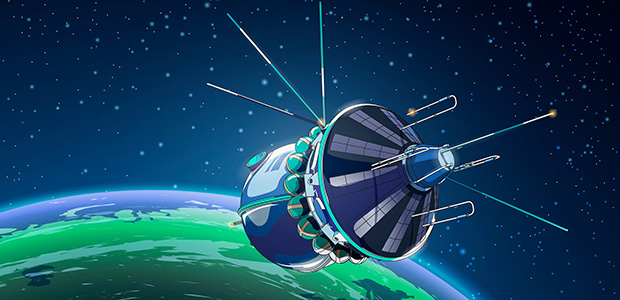
Kuva Space snapshotting earth to improve our awareness
Have you ever been told you are "too close to the matter" to give a full or unbiased overview? What you are being told is you need to give the matter some space to see things clearer. Kuva Space is literally doing that.
This article originally appeared in the January/February issue of Startups Magazine. Click here to subscribe
By trying to get a better awareness of our Earth, it is taking off into the stars so it can observe this pale blue dot from above. Kuva Space started at the Aalto University campus. The founders, Tuomas Tikka and Janne Kuhno, were the core team members of the first Finnish CubeSat under the Aalto space programme. Following the success of Aalto-1, they partnered with Reaktor, a Finnish technology consulting company, and established RSL in 2016. This marked the beginning of their journey in crafting satellites equipped with groundbreaking technology payloads. By the end of 2021, Tuomas Tikka transitioned from CEO to CTO, and Jarkko Antila assumed the CEO role.
Antila is well qualified for the role, as he tells Startups Magazine: "I hold a master's degree in Space Technology and have contributed to multiple space endeavours, including the development of hyperspectral payloads for satellite missions. Additionally, I co-founded Spectral Engines, a Finnish spectral sensor company, where I served as CEO for six successful years before exiting."
It is therefore no wonder that Kuva Space has been on the up since he took the helm. By 2025, the startup aims to launch the first four satellites, with plans for 20 satellites per year from 2026.
A SNAPSHOT OF KUVA SPACE
Kuva Space is a startup specialising in providing advanced hyperspectral imaging services from space. Its core technology involves using nanosatellites equipped with hyperspectral cameras to capture high-resolution images of the Earth. These images are significantly detailed, offering a wide range of wavelengths beyond what the human eye can see. Through satellites that occupy the Low Earth Orbit, the technology then enables regular and precise monitoring and analysis of various environmental and agricultural parameters. Kuva Space's services are designed to aid in fields like agriculture, forestry, environmental monitoring, and urban planning, providing critical data for resource management, environmental protection, and sustainable development. An example of someone using this could be an NGO that wants to track levels of carbon sequestration and biodiversity in a particular area. They could select their area of observation, and then receive data for them to gather insights on. AI can be applied to the data before being given to the end user so actionable insights are available immediately. The AI is applied both on the ground, and in orbit (where it is used to refine the raw data through optimising and cleansing data). The AI processing that the data goes through means that users already receive actionable insights by the time they get it.
This becomes increasingly important as the environment begins changing due to the climate changing. "We wanted to leverage our extensive knowledge and experience in microsatellite missions for a more profound purpose," explains Antila on why the company shifted from designing and constructing satellites to a service that provides earth observation imagery from their satellite network. "We saw the rising need for climate change-related information and also the camera technology was maturing to a point, where we realised that it was the right time to change the focus."
This environmental angle is also reflected in the way the company designs its microsatellites, which weigh between 20-30kg, and are therefore environmentally friendly due to their smaller size. This miniaturisation is possible due to the startup's experience in crafting nanosatellites since 2016, which allows deployments of a fleet of 100 hyperspectral satellites that can all be powered by solar energy.
THE STARTUP SPACE
For a startup, where cash isn't as abundant as a big company, why would Kuva Space want to try to tackle something as big budget as space? "While earth observation involves substantial costs, our extensive microsatellite constellation is cost-efficient and scientifically credible," says Antila. "We are leveraging these strengths to pioneer new frontiers in AI-powered insights-as-a-service business models in the Earth observation industry."
This pioneering spirit is, as mentioned earlier, reflected in Kuva Space's ambition for the future. Yet that doesn't mean it has been without issue. Launching an operational satellite is just the first step; the real challenge lies in ensuring that the satellite functions and delivers the high-quality data. After all, satellites in LEO encounter radiation, which can pose significant challenges to their operation and longevity. As Antila explains: "The most significant challenge thus far has been ensuring the robustness of our satellite, particularly as we work with novel camera technology packed into a compact size that must operate in the harsh conditions of space."
Yet, Kuva Space has been investing extra efforts to guarantee that its upcoming launch in June/July 2024 goes off without a hitch; taking steps to ensure smooth data capture, downlink, and seamless automated AI processing, setting the stage for the success of the hyperspectral constellation.
TO INFINITY, AND WHAT'S BEYOND?
"Firstly, we need to launch our first batch of satellites and thoroughly test our end-to-end service platform in 2024," explains Antila. Although Kuva Space has reached a number of milestones, like in 2018 with the launch of one of the first Finnish nanosatellites, it is now working on getting early customers on board with its service, which the company expect to increase during the second half of 2024, when it deploys its first satellite, Hyperfield-1, into orbit.
Outside of Kuva Space, there are things to be hopeful for, Antila explains, citing Finland joining NATO in April 2023 as opening up new potential business avenues for the startup, who already provide for both the private and public sector. It seems for this startup, who focus on space, its goals are as lofty as its satellites, making the sky the limit.

